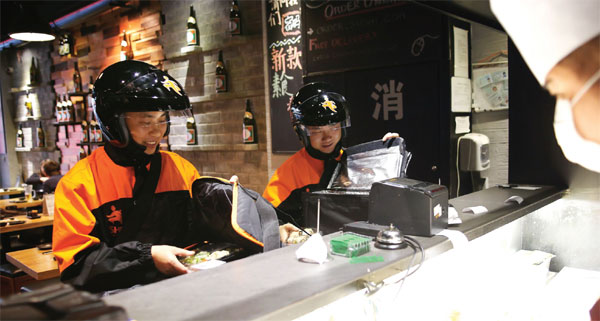Venture capital monsoon a boon for expats
Updated: 2015-03-20 12:16
By Matt Hodges(China Daily USA)
|
||||||||
The new American Dream is being built in China - by expats working in league with local companies and investors to tap a rising middle class with higher quality-of-life expectations, writes Matt Hodges.
Most expats in Shanghai either use or at least know of Sherpa's, the food delivery service launched by Michigan's Mark Secchia in 1999. Even for Chinese, who make up a minority of its customer base, its army of orange-and-black couriers are a familiar sight. They may not be as ubiquitous as the mopeds delivering McDonald's or Pizza Hut, but they have become a big part of the urban landscape.
Showing something of a Midas touch, Secchia took $50,000 seed money in 1999 and turned it into a $20-million-per-year business targeting foreigners in Shanghai, Beijing and idyllic Suzhou in Jiangsu province. Sherpa's 313 client restaurants now serve 92,000 dishes, yielding about 3,000 orders on a good day, or one every 10 seconds online at peak times.
"I lend a foreign face to Chinese companies, and Chinese companies lend themselves to me. It's a partnership," said the 41-year-old, who dabbled in consulting, food delivery and export businesses before settling on Sherpa's. Entrepreneurialism runs in his blood: His father used to run a logging firm.
Like many others, Secchia is busy living the China Expat Dream. Chinese are natural-born entrepreneurs, and that DNA in many ways defines Shanghai. It also rubs off and clones more in its image. A skewed percentage of the city's upwardly mobile residents harbor dreams of running their own show, both foreign and Chinese.
"The large businesses of the future are being built right now, and we think a lot of them are being built in Shanghai," said Scott Williams, vice president of the American Chamber of Commerce in Shanghai (AmCham Shanghai).
The non-profit business organization has about 1,800 members, 35 percent of which are small businesses. "That's a substantial amount," he said. "Those in start-up mode or looking to attract investors are in the hundreds."
On angels' wings
Foreign entrepreneurs can also turn to: incubators like Chinaccelerator, which supports local and international IT start-ups with mentors, working space and investment; local support systems like Shanghai Angel Investors; or "impact labs" such as Transist. This American-run operation invests up to $500,000 as debt or equity in young companies that show they can create social and financial value.
"We see more desire to partner than five years ago, and there's a greater desire for project-specific innovation partnerships, especially for goods and services that support lifestyle improvement," said Williams.
A fast-changing bureaucratic landscape is also making it easier for non-Chinese to register a company with limited or no capital. Many returning Chinese or Americans with experience in Silicon Valley are seeking, and increasingly finding, investors.
"That's the special thing about Shanghai - there are so many different types of people trying different things," said American-Chinese Kevin Yu, who set up SideChef in January 2013.
The $5 app offers 1,500 recipes and partnerships with Michelin-star chefs and celebrity food bloggers. It was named one of the best apps of 2014 by USA Today and has offices in Shanghai and Santa Monica.
"We raised money from angels and institutional investors. Chinese investors are definitely getting more into early-stage investors, especially in high-tech, innovative fields," he said. "They're interested in companies that are trying to invent."
Diana Tsai runs League X, an agency for high-growth China tech startups specializing in storytelling, design and power partnerships. The company partners with local venture capitalists and works with their portfolio companies. It is also doing China's first startup ecosystem report in partnership with Silicon Valley-based Compass.
"What we've learned is there's far more money here than good startups. There's a lot of money here that is looking to follow instead of lead. There's a lot of talk of 'visionary entrepreneurs'," said Tsai, whose mom hails from Shanghai.
First in, best dressed
When it comes to Sherpa's, Secchia's success owes as much to his business savvy as to his early-player advantage.
He is fluent in Mandarin, was one of the first foreigners to earn an MBA from Shanghai's prestigious China-Europe International Business School (CEIBS) - and he knows how to work with the Chinese.
Secchia doesn't actually have a joint venture or wholly owned foreign enterprise (WOFE) to do the business. He uses it as a consulting platform through which he consults to local companies like Sherpa's.
"I do this weird mix. I'm neither Chinese nor foreign. I'm both," he said. "Take Sherpa's, for example. We look like a foreign company at hiring fairs, but in reality everything is like a Chinese company."
To set up his latest venture, he registered a WOFE, of which he is the owner and only employee. The company has a contract with Sherpa's to act as its sole supplier, but Sherpa's is owned by Secchia's silent business partner, Shanghai's Benny Ji. The two were classmates at CEIBS.
However brash the Shanghainese may seem, forging links with them can pay dividends, he said.
"They can be a bit standoffish from the beginning, unlike in Beijing, where you can instantly be someone's 'gemenr' (brother)," he said. "But once you do establish relationships they run very, very deep and last throughout much more adversity than a relationship that is made too easily and quickly like in other areas of China."
Flavor of the month
Michael Michelini, author of "Hong Kong Supercharged", is finishing his second book on setting up a company in China.
"If you want to import luxury goods or food to supply Chinese people, and find distributors, Shanghai is where it's at," he said.
Element Fresh, a health-accented restaurant chain started by Americans Scott Minoie and Sheldon Habiger in 2001, now has 26 restaurants spread across several Chinese cities.
Wagas and Yasmine's Steakhouse and Butcher Shop also number among the foreign-founded success stories in the local food and beverage industry.
The local business climate also favors fashion, cosmetics, advertising agencies "and to a lesser extent, finance, but this is growing," according to T.R. Harrington, the American founder of digital marketing consultancy Darwin Marketing.
Healthcare is another biggie. Demand is escalating for higher-quality medical services, supplements, vitamins - even protein shakes.
The specialist
New Yorker Scott Kein, 51, worked with the US Olympic Committee to set up a special orthopedic program for the 2008 Beijing Games. Later he partnered with NFL China to provide sports medicine services.
"Now you see more people coming here with niche skills and working with rather than against local companies, and trying to complement what they do," he said.
He registered his company, the Institute of Western Surgery (IWS), in Guangzhou, near the border with Hong Kong, in 2009. It provides subspecialist medical care and other services, and recently set up a second office in Shanghai.
"Shanghai has lots of good-quality primary care doctors, but very few specialists," he said. "In Guangzhou, people would go to Hong Kong for treatment, but people don't want to leave Shanghai."
"We work with clinics and private hospitals, but we want to do it in a way that's collaborative," he said. "We help them bring in specialized equipment, or doctors to carry out non-invasive surgery. We help multinationals with their diabetes testing and get the technicians trained and come up with a whole business plan."
"What we do is very unique. Our model doesn't exist in the US," he added. "But now there's a government push to promote public health here."
Williams is also seeing "tremendous demand for supplemental education for the middle class." "Anything online you can subscribe to is of high interest," he added.
AmCham Shanghai's SME Center welcomes drop-in visitors at its office next to the Portman Ritz-Carlton on Nanjing Road, an epicenter for luxury shopping. For $1,000 a year, companies can get plugged in to the AmCham matrix and have a useful digital platform at their disposal. It also works closely with the Shanghai Foreign Investment Development Board (Invest Shanghai).
"The key for success is to team up with the right providers: The right Chinese suppliers, the right Chinese e-commerce firms, people who can provide accurate information on logistics and free trade zones," he said.
Yu Ran in Shanghai contributed to this story
|
Sherpa's founder Mark Secchia, pictured below with some of his couriers, is partnering up with a local food delivery company to further tap the local market. Provided to China Daily |
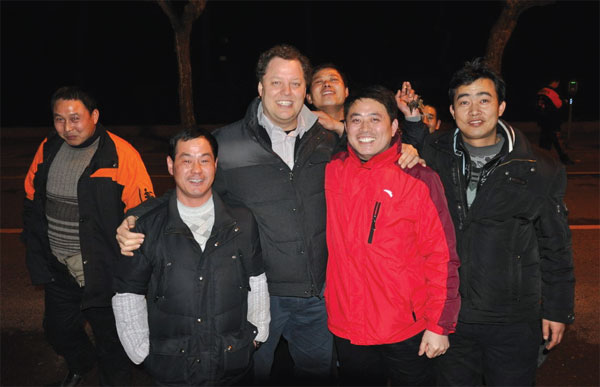
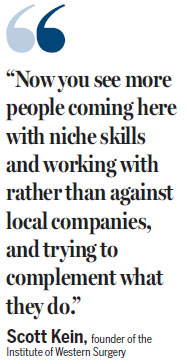
(China Daily USA 03/20/2015 page8)

 How much do world leaders earn?
How much do world leaders earn?
 Daredevil ropejumpers leap 200 meter off cliff
Daredevil ropejumpers leap 200 meter off cliff
 Harley motorcade shows up in Boao, Hainan
Harley motorcade shows up in Boao, Hainan
 Ming art sets Christie's high
Ming art sets Christie's high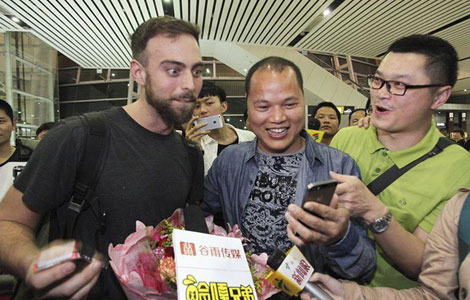
 Stolen-phone bromance blossoms in China
Stolen-phone bromance blossoms in China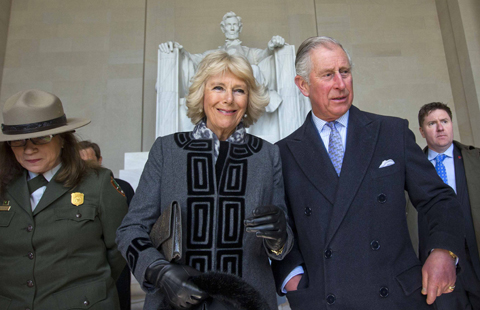
 Prince Charles, Camilla get royal tour of Washington
Prince Charles, Camilla get royal tour of Washington
 Should selfie sticks be banned?
Should selfie sticks be banned?
 Tunisians demonstrate against terrorism
Tunisians demonstrate against terrorism
Most Viewed
Editor's Picks

|

|

|

|

|

|
Today's Top News
Yahoo to exit from Chinese mainland market
US sends 'green' mission to China
Sticking it to the selfie stick
China's eco-friendly companies stand to gain
China's global image on rise
3 killed in shooting at California convenience store
More Chinese film companies tap into Hollywood
Microsoft tackles China piracy with free upgrade to Windows 10
US Weekly

|

|
